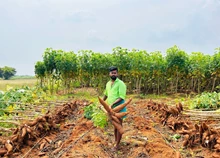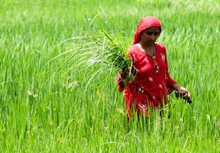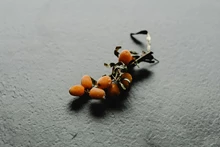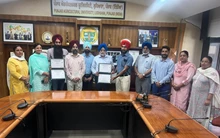
Crop genetic diversity is essential for ensuring food and nutritional security. However, the extensive use of cultivated varieties in breeding programs can lead to a reduction in genetic diversity. This narrowing of genetic variation can pose challenges for developing crops that are resilient to climate change and for maintaining diversified farming systems. BOLD (Biodiversity for Opportunities, Livelihoods, and Development) is a groundbreaking 10-year project, funded by the Government of Norway and led by the Global Crop Diversity Trust, to strengthen food and nutrition security worldwide by supporting the conservation and use of crop diversity.
Under the BOLD umbrella, the International Center for Agriculture Research in the Dry Areas (ICARDA) is leading a project entitled “Augmenting and Upscaling CWR-derived Grass pea Elites for Climate Resilience in Farmers’ Fields (AUGER)”. BOLD-AUGER was launched in 2022 and aims to create novel varieties of grass peas with low ODAP content by utilizing elite lines derived from crop wild relatives (CWR). The key collaborators include the Indian Institute of Pulse Research (India), the Nepal Agricultural Research Council (Nepal), and the Bangladesh Agricultural Research Institute (Bangladesh).
“Grass pea is one of the most resilient legume crops, capable of withstanding climatic change and serving as a source of survival food during drought-induced famines,” says Shiv Kumar Agrawal, Regional Coordinator, South Asia and China Regional Program, ICARDA. It is known for its ability to provide both nutritious food and leafy vegetables for human consumption, as well as protein-rich feed and fodder for livestock. While grass pea possesses significant potential benefits, its cultivation is restricted to South Asia and Sub-Saharan Africa as a survival crop mainly grown by marginal farmers.
One of the main factors contributing to this is the presence of β-N-oxalyl-L-α,β-diaminopropionic acid (ODAP), found in the seeds and vegetative tissues of the plant. Prolonged consumption of grass pea over 2-3 months can result in symptoms such as weakness and eventual paralysis of the lower limbs. There is a genetic solution to lower the ODAP content in grasspeas through the use of crop wild relatives and replacing old high-ODAP varieties with low-ODAP elite lines recently developed through pre-breeding efforts in target countries.
The grass pea program at ICARDA has benefited from the extensive evaluation and use of landraces and crop wild relatives (CWR), thanks to the two projects supported by the Norwegian government and Templeton World Charity Foundation and coordinated by the Crop Trust. "The novel diversity created under the CWR and Templeton projects provides fundamental breeding material for developing new high-yielding and stress-resistant grass pea varieties with low ODAP content under the BOLD project,” says Shivali Sharma, a Pre-breeding expert at the Crop Trust.
Pre-breeding activities using CWR under these projects have improved not only the trait value but also infused new genetic variation for continuous improvement in traits of breeders’ interest. BOLD-AUGER also aims to advance these crop wild relatives (CWRs) populations, evaluate CWR-derived fixed lines, and integrate them into the mainstream breeding pipeline for the development of new grass pea varieties with low ODAP content through farmers’ participatory evaluation. The introduction of these promising lines derived from crop wild relatives instills optimism for a brighter future of grass pea cultivation in India, Nepal, and Bangladesh.
“However, active engagement of different stakeholders including extension specialists, and policymakers will be required to ensure seed availability and quick adoption of the low ODAP cultivars for large-scale cultivation at the farmers’ fields in the target countries," says Shivali Sharma. The introduction of new low-ODAP varieties is expected to enhance food and nutritional security, bolster resistance to pests and diseases, strengthen resilience against climate change, and contribute to improved livelihoods for farmers.
About the Crop Trust
The Crop Trust is an international organization dedicated to preserving crop diversity and, as a result, global food and nutrition security. The Crop Trust is built on an endowment fund that is dedicated to providing consistent financial support to critical genebanks around the world. It actively seeks to preserve and make crop diversity available by collaborating with global partners. It contributes significantly to the Svalbard Global Seed Vault and contributes to large-scale projects worldwide to secure crop diversity and make it available for use. The Crop Trust is recognized as a vital component of the funding strategy for the International Treaty on Plant Genetic Resources for Food and Agriculture
About ICARDA
The International Center for Agricultural Research in the Dry Areas (ICARDA) is an international, autonomous non-profit research organization that is part of the CGIAR, a global research partnership for a food-secure future. ICARDA’s mission is to reduce poverty, and enhance food, water, and nutrition security, as well as environmental health, in the face of global challenges. ICARDA has a tight network of national partners that annually receive, test, and report on the performance of the germplasm produced by its breeding programs.
The genebank of ICARDA is of an international gold standard and has tight linkages to the five partner genebanks involved here. ICARDA operates its major breeding and genebank activities in Morocco, India, and Lebanon, where research stations, farm equipment, and staff are in place. In Nepal, India, and Bangladesh, ICARDA manages its major projects through its South Asia and China Regional Program (SACRP), based in New Delhi, India, and led by its scientists. Through partnerships with national programs, we have in place an effective network of research for development.
ICARDA has implemented a project successfully focusing on promoting low ODAP grass pea varieties through a community-based approach in India in 2016. Through systematic demonstrations, education, and awareness programs among farmers, the fears related to possible health hazards were overcome. Various activities demonstrated that improved varieties (mainly Nirmal, Ratan, Prateek, and Mahateora) not only resulted in low-toxin crops but also increased farmers’ income.











